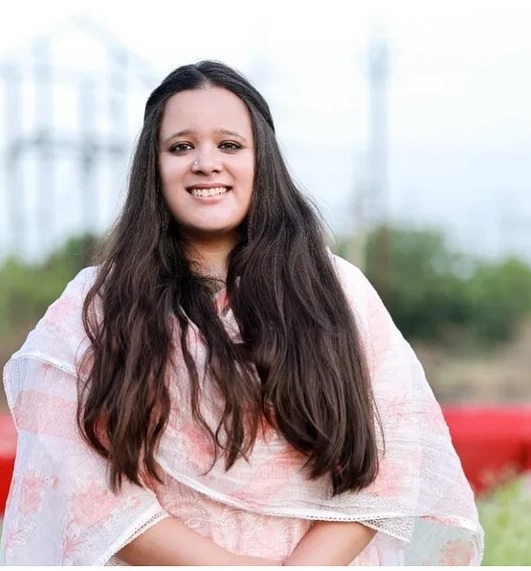Nidhi Pant is one of the co-founders of S4S Technologies, an agritech startup which is using its solar-powered dehydration system to help 1,200 micro-entrepreneurs and 60,000 smallholder farmers in Maharashtra, Tamil Nadu, and Odisha earn a stable income.
This is the story of how seven enterprising young men and women came together with a common aim: building a team to tackle some of the most challenging problems faced by the food industry and farmers in the hinterlands.
In 2019, Vaibhav Tikde, Tushar Gaware, Shital Somani, Swapnil Kokate, Nidhi Pant, Ashwin Pawade and Ganesh Bhere founded S4S (Science for Society) Technologies to build a customer-centric, sustainable, and equitable agri-value chain, by combining technology with business.
Vaibhav Tikde, the CEO of S4S Technologies, formed the team comprising his juniors in college and mutual acquaintances/friends.
Nidhi Pant, the Co-founder of S4S technologies, works at the intersection of agriculture, gender energy access, and financial inclusion.
At the heart of S4S Technologies are smallholder women farmers trained to be micro-entrepreneurs with the right combination of tech, finance, and market access, increasing their household income by 100-200% annually.
“Since a young age, I have been actively involved in rebuilding communities affected by natural calamities in rural areas. I wanted to use my background in chemical technology to bring about change,” Pant says.
She points out that the agriculture sector employs 80% of all economically active women in India, comprising 33% of the total agricultural workforce in the country.
“Most of these households live on less than $2.5 per day (around Rs 206) and are in poverty. Daily wage opportunities are available but limited, keeping more than 120 million rural women out of work in India. Also, food worth $16 billion gets wasted in India every year. What brought us together was the common purpose to solve the three big challenges of food wastage, poverty among smallholder farmers, and gender inequality among rural women farmers.”
S4S started by providing technology solutions to farmers for reducing food wastage, but realised that farmers are not marketers and providing market linkage with technology is necessary to integrate buyback of the processed produce.
How it works
At the heart of the S4S business model is village-level sourcing and processing operated by women farmers turned micro-entrepreneurs (MEs).
S4S works with women micro-entrepreneurs to convert produce into non-perishables by providing them with the right combination of technology, finance, and market.
“S4S has innovated in all four areas – patented technology, access to finance for unbanked women farmers, and provision of nutrition-dense superior quality food products to F&B industry, and training our micro-entrepreneurs on how to meet the needs of the industry,” she says.
The processing is done through a solar-powered dehydration system, with a solar conduction dryer that can process 45+ different food categories (fruits and vegetables, pulses and grains, nuts, spices, tea, coffee, milk, alternate proteins), and requires no electricity.
This is deployed at farms to reduce food wastage at source. Farmers can store produce for a long time as the shelf life is increased to a year without the need for cold storage.
The processed produce is made fit for the customer at the central facility and supplied as food ingredients to the food and beverage industry.
Serving over 1,100 B2B customers, S4S works with 1,200 micro-entrepreneurs and 60,000 smallholder farmers in Maharashtra, Tamil Nadu, and Odisha, and processes 60,000 tonnes of produce.
How women micro-entrepreneurs benefit
Pant emphasises that women are at the centre in all three areas of its solution – technology, market, and financing.
Technology: The patent solar drying system has minimal moving parts and is easy to use and service.
Financing: S4S’ banking partnerships enable financing for woman farmers at a rate of 6%, with no initial upfront capital required. They can access to finance to buy the solar drying system even though they are new to credit and were not present in the formal banking system.
Market linkage: With surplus demand, the company can provide assured market linkage to farmers and micro-entrepreneurs. This enables the women micro-entrepreneurs to earn an annual additional income that directly contributes to their profit and doubles household income.
S4S’ customers are Indian and global, including the food and beverage industry, which includes food FMCG companies, SMEs, and HORECA.
“By integrating gender into agriculture-related climate change activities and policy, S4S enables rural women to become important agents of change and innovators. We help women access information and technologies, cultivate entrepreneurial and marketing skills, and gain the ability to discuss and negotiate and understand policy issues that affect them as farmers,” Pant says.
Declining to provide information on funding, she reveals that S4S clocked a revenue of Rs 43 crore in FY22.
During the pandemic, S4S saw increased interest by farmers from other villages to sign up for S4S’s Drying Partner Programme.
“With lack of storage facility, limited transportation, and distant markets during the pandemic, S4S’s model of preserving the produce at the farm gate proved to be an ideal option for sustaining the livelihoods of farming families. With reverse migration, most villagers were in need of livelihood-generating opportunities at the village level. In most other tried options, the assured market was not present,” Pant says.
For her efforts, Pant has received many awards, including the Women Transforming India Awards by NITI Aayog and United Nations (UN), Cisco Youth Leadership Award 2022 by Global Citizen & CISCO, Unilever Young Entrepreneur Award 2019 by Unilever and the University of Cambridge Institute for Sustainability Leadership, and more.
Pant believes S4S grows only when its micro-entrepreneurs earn.
“The financial success of the company is tied in with the success of our micro-entrepreneurs. We also have surplus demand, available finance, and network effect in our value chain, which enables us to grow and deepen our impact,” Pant concludes.











